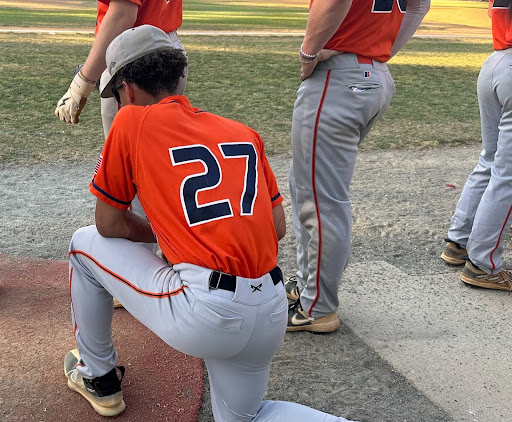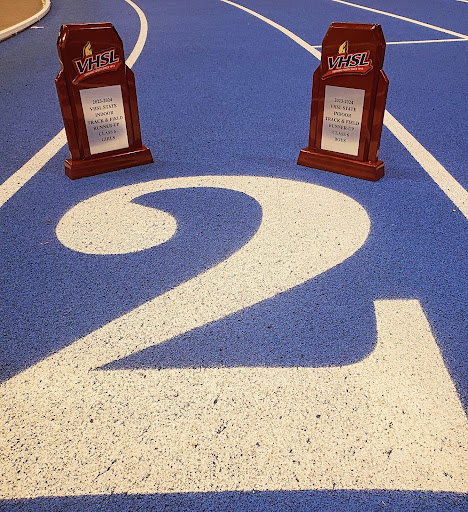![“My dad started me [in golf] when I was four years old and then in about eighth grade, when
COVID-19 started, I started playing competitively,” said varsity golf captain Grace Saunders.](https://theoracleonline.org/wp-content/uploads/2023/11/unnamed-7.png)
For student athletes, committing to the same sport for all four years of high school is an achievement, especially for those who train and compete year-round. But it doesn’t come without some drawbacks.
Balancing academia and athletics can be a difficult task to sustain. Staying focused on both sports and school is senior golf captain Grace Saunders’ main reason for experiencing stress.
“Golf is what I am using to get into college, so it feels more like a part time job to me than anything,” said Saunders. “When I play golf with my family or close friends, it can be relaxing. Once you start playing competitively though, it isn’t very relaxing.”
Oftentimes, personal relationships suffer as a consequence of dedicating the majority of time to a sport and schoolwork simultaneously.
“I’ve had strained relationships because I am preoccupied,” said Saunders. “I have to practice a minimum of 15 hours a week, which means that sometimes I have to miss things with friends or I have to miss trips because I am traveling at the same time. [My lifestyle] is really hard to explain to others and it’s hard to tell myself that I’m doing the right thing.”
For others, like alumnus Keshav Goyal who was the 2022-2023 boys tennis team captain, their sport can be used as an outlet for school or life-related pressures.
“It was not difficult to enjoy high school tennis with [school and life] going on. In fact, it was one of the things I looked forward to the most,” said Goyal. “I found joy in tennis through its competitive spirit and in growing close with the team, causing us to have great chemistry and play better.”
Twelve-season athlete and alumna EmmaLia Ciccarello is now a collegiate runner at Susquehanna University and attributes her successful transition to collegiate running to the dedication she learned as a high school athlete.
“Being a 12-season athlete has taught me about commitments, and learning to love the sport even when things are difficult. I overcame a lot of challenges and injuries during those 12 seasons that helped me push through obstacles in everyday life,” said Ciccarello.
Saunders explained staying committed to a single sport over multiple years is challenging.
“The biggest time I considered quitting was last winter when I had a really big score increase and I was considering if I should even continue to play in college. But I worked through that and now I wouldn’t trade it for the world,” said Saunders. “My regular coach is a really big part of [the reason I am still playing golf]. He is a super big influence and he was always there for me, so that was really important.”
Saunders encourages student athletes to not go through rough patches in their athletic careers alone and to discuss decisions with people close to them.
“Talk to people who really care about you. You can’t make [the decision to quit a sport] on your own because when you are in that moment you are obviously confused about it. Talking to people who know you, but also are fairly objective in the matter, will be able to help,” said Saunders.
Sophomore Charlotte Petrick decided to quit playing volleyball after her freshman season because of time constraints and the impact on her academics.
“I actually really loved volleyball, but it was just way too time-consuming,” said Petrick. “Since I started taking AP classes and with classes getting harder, I wanted to dedicate more of my time to school and the sports that I was really interested in, soccer and diving.”
Sophomore Georgia Hudson explained that quitting or switching a sport can be a hard change to make, especially if it’s one to which years have been dedicated. Contrastingly, quitting a sport after a long period can turn out to be a great decision for the mental well-being of an athlete.
“I kind of stopped liking [swimming]. When I moved back from Germany I joined a team here and I just didn’t like it very much. I kind of stuck it out until ninth grade and decided I didn’t want to do it anymore,” said Hudson, who switched from swimming to rowing in Generally, athletes will make the best decisions for themselves at the time, factoring in their mental health and well-being. “Commitment to a sport teaches you a lot of life lessons and to get through the hard times. It is really hard, but it teaches you perseverance,” said Saunders.






